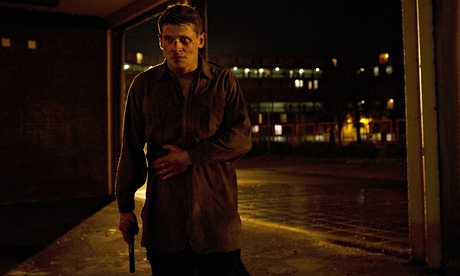
Less indebted to Jim Sheridan’s In the Name of the Father or Paul Greengrass’s Bloody Sunday than Walter Hill’s The Warriors and John Carpenter’s Assault on Precinct 13, this tale of a young squaddie lost on the streets of Belfast during the Troubles boasts another mesmerising performance from sinewy rising star Jack O’Connell. Having sunk his teeth into the prison-bound Starred Up (when his vibrant physicality recalled a young Malcolm McDowell), O’Connell displays a winning vulnerability in this muscular, moody thriller which has one foot in the all-too-real turmoils of recent history and another in the dreamscapes of post-apocalyptic cinema. The action may take place in 1970s Northern Ireland, but the bombed-out buildings, barricaded streets and burning buses which provide the ochre background glow evoke the spectre of John Hillcoat’s The Road or even George Miller’s Mad Max – a timeless wasteland of quasi-mythical, purgatorial conflict.
O’Connell plays Private Gary Hook, a punchy Derby lad sent on an “emergency basis” to Belfast, which he is curtly informed is “not abroad”. On the first day of manoeuvres, Hook’s wet-behind-the-ears regiment is deployed on the Falls Road to assist the RUC on a house-to-house search, the ferocity of which soon provokes a riot; bricks are thrown, shots are fired, and chaos ensues in which Hook and a fellow soldier are separated from their comrades. As the army beat a terrified retreat, Hook escapes into unknown streets, caught behind enemy lines, waiting for the cover of night to attempt his escape.
Although the title alludes specifically to the year that internment was reintroduced, Black Watch writer Gregory Burke’s script seems to draw inspiration from the notorious Falls curfew of July 1970, when troops locked down a nationalist stronghold after a house search for weapons turned into a pitched-battle-cum-siege. In the ensuing melee, ructions flared not merely between residents and their putative rulers, but between the Official and newly emergent Provisional IRA. Appropriately, ’71 adopts an apolitical nihilism, depicting rampant internecine rivalry in which everyone is at each other’s throats: nationalists and loyalists; army and RUC; squaddies and Military Reaction Force undercover agents; officials and foot soldiers – on both sides of the divide. In the middle of this mayhem is Hook, randomly aided and/or hunted regardless of his nominal allegiance; asked if he is Protestant or Catholic, he replies pitifully “I don’t know... ”
Born in France and raised in London, feature first-timer Yann Demange (best known for TV’s Top Boy) admits that his perspective on the Gordian knot of Irish history is that of an outsider, a position the movie staunchly maintains; we see events unfolding through the eyes of a young man who has no idea of the complexity of the conflict into which he has been dropped, nor of the cause for which he is fighting. If the film has an agenda, it is merely to show that these combatants are obscenely young and uniformly disempowered – one ripe line describes army life as “rich cunts telling dumb cunts to kill poor cunts”. Inevitably, there will be cries of exploitation, a charge levelled against Marc Evans’s underrated Resurrection Man, which controversially reinterpreted the loyalist brutalities of the Shankill Butchers as a tale of latterday vampires. There’s something of Evans’s crepuscular milieu in ’71, cinematographer Tat Radcliffe shifting from the vérité 16mm grain of the daytime sequences (the on-foot chases are breathtakingly gritty) to the eerie aura of digital for the creepy nocturnal segments, all foggy street lamps, misty vistas, and brooding darkened alleyways. I was also reminded of the surreal quality of the “Ducky Boys” scenes from Philip Kaufman’s The Wanderers, in which an unsuspecting Bronx youth stumbles into the misty lair of a quasi-mythical Irish gang where nightmarish apparitions lurk.
Holding it all together is David Holmes’s terrific score, chiming guitars and alarum drums hovering over a rubble-bed of sampled sounds and remodulated chords, plaintive melodies emerging from a bedrock of discord and disquiet. Sound design is crucial throughout; one particularly arresting (and historically accurate) scene finds womenfolk banging steel dustbin-lids on pavements as armoured vehicles roll onto their streets, a clattering cacophony which instils a rising tide of anxiety in the incomers and audience alike. Later, as the action moves to the Divis flats (Sheffield’s Park Hill estate doubling for Belfast, along with Blackburn and Liverpool), Demange uses Holmes’s eerie score (to which he listened on set) to generate both growing tension and weirdly uncanny unease.
Strong performances from a well-chosen ensemble cast add to the impact, with particular plaudits going to Sean Harris as a weasely undercover agent with rat-in-the-skull killer instincts, and Sam Reid as a posh-boy commanding officer woefully out of his depths on the working-class streets of what is most definitely “another country” – or perhaps more accurately another world.

